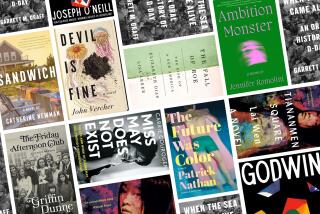The word at Camp G
- Share via
Last night was my book club night. We eat, we drink, we argue about books and politics and everything else going on in our lives. It’s a swell evening.
Last Saturday morning, I went to a different book club. This one meets behind locked doors. Its members are teenage boys, and they’re serving time in Camp Gonzales in Calabasas for crimes such as burglary and car theft, or for violating probation.
My book club has read about Shakespeare and Stalin and the Civil War. The Camp G club has read about soldiers and the talismans they take to war. They’ve read “The Alchemist” and “The Curious Incident of the Dog in the Night-Time,” books chosen because there’s some element -- a broken family, a child facing a big problem -- for them to suss out and figure out how it touches them.
My book club starts with catching-up gab. Camp G’s starts with reading its rules, which fall between etiquette and 12-step advice: about respecting others’ opinions, about how they can change the future by controlling themselves in the present.
Ten guys, in baggy orange camp-issued shorts, draw up chairs around banged-up metal tables in a cinder-block room. Otherwise, they’d be spending Saturday doing mandatory recreation, then “flatbacking” on their beds in the dormitory. The book group is one of the few choices they get to make for themselves at Camp G.
Chris reads the rules aloud, fluidly. His siblings finished high school and even college. “I wanted to be the outcast, to do what nobody else was doing,” which is how he landed here.
Josh just discovered Dan Brown’s novels. “They long, but they goooood,” he assures the others. His story is a flip-side to Chris’. He is a third-generation gang-banger. “I had straight A’s in elementary, middle school -- no one ever cared. ... No one noticed you until you started gang-banging.”
The book now is “Music of the Mill,” Luis J. Rodriguez’s novel about a Mexican American family and race and class in a Southern California steel mill after World War II. For John, “It’s the best book I ever read. I just loved it. I love all the books we read, but I loved this one more because it was about a struggle, you know? He came from nothin’ and came to L.A., you know, and started working hard.”
Dan Seaver is the adult volunteer who leads the group. He soft-pitches ideas to see where the guys will take the conversation. This book is about Latinos -- but what about the black people in the book? The white people? Do their problems come from their families or from the community?
The kids’ pronouns slip back and forth from the “he” and “they” of the book to the “me” and “us” of their own lives, and the book’s characters morph into brothers who let them down, dads who disappear.
Seaver asks if the steelworkers union is a kind of gang. “Seems like everything is a gang,” says DeMarcus. “Unions, police ... “ “Book clubs,” says Josh, and everyone laughs.
So who deserves your loyalties, Seaver asks -- the people who pay your salary? Your family? When do you get to the point you don’t need any gang any more?
“When you can take a vacation with your kids, to Palm Springs or Laughlin,” says Josh.
“When you get a good job, you can have a career,” says John. “That’ll lead to bigger and better things, and you can retire and still have money coming in.” He says it like he’s describing a miracle. In his world, maybe it is.
I asked what the book club means to them.
Josh: “You forget you’re locked up ... you don’t gotta put up a front and act hard. You ain’t no inmate for a little bit -- you’re just a regular person.”
LaSalle: “Book club is my home away from home.”
Joseph: “I’m learning things that will probably help me later in life.”
Chris: “It feels good to be called Chris, in a room where people are actually encouraging me to be good.”
I certainly don’t think of my book club that way, but these guys need some big expectations. Their lives can still go either way. Some may wind up in prison. Without this book club, or the camp newspaper or the drama club to show them another way, a lot more of them will never hold a job or take their kids to Laughlin or collect Social Security -- they’ll be living on your tab in state prison.
The choice is theirs -- but it’s also yours. You’ll be voting in November on an initiative that would turn back the clock on rehabilitation, grab another half a billion dollars a year for the fat prison budget and take spending decisions away from locals -- like the group that created this book club. At Camp G, Josh and company could be back spending their Saturdays doing a whole lot of nothing.
As Josh says, the book club is no place to act tough. But the voting booth is. Are you tough enough to stop spending on fear and start spending on hope -- maybe with something as cheap as the price of a good book?
--
More to Read
Sign up for our Book Club newsletter
Get the latest news, events and more from the Los Angeles Times Book Club, and help us get L.A. reading and talking.
You may occasionally receive promotional content from the Los Angeles Times.











